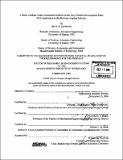A multi-attribute value assessment method for the early product development phase with application to the business airplane industry
Author(s)
Downen, Troy Douglas
DownloadFull printable version (36.02Mb)
Other Contributors
Massachusetts Institute of Technology. Engineering Systems Division.
Advisor
Deborah J. Nightingale.
Terms of use
Metadata
Show full item recordAbstract
(cont.) market. The method is also used to extract quantitative evidence indicating the existence of enterprise-related attributes for consumer value in products. Marking the first independent review of the loss function-based value method, this study finds that the Relative Value Index is superior to existing value methods at retaining simplicity of implementation and minimal data requirements while maintaining a firm grounding in economics and consumer choice theory. The method is shown to be useful for estimation, though robustness of the results is not certain when used in this manner, and may also be extended to the analysis of large-scale engineering systems and their value to society. The early phase of product development, sometimes referred to as the fuzzy front-end, is critical to the success of enterprises and plays a dominant role in the formation and execution of corporate strategy. In addition, it has been argued that the concept of consumer value is central to effective product development. In this research, a new product value assessment method is established for the fuzzy front-end of business airplane development. Existing value assessment techniques used in the business aviation industry are found to poorly balance the theoretical rigor of the method with the ease of use and accuracy required by practitioners in early product development. A recently-developed multi-attribute value method, based on Taguchi's loss function approach to quality assessment, is modified and extended in this study and applied for the first time to the domain of business aviation. A comprehensive 40-year historical product database is developed for use in testing and evaluating the method, referred to as the Relative Value Index (RVI), enabling the scope of value method appraisal to be expanded to an industry-wide examination over a significant time span. A top-down approach is developed for calibrating value models to empirical market data via attribute weighting factors. Sensitivity analyses and Monte Carlo simulations are developed to test the RVI method's robustness and the reliability of the results, enabling a rigorous definition of the determinants of product competition in this industry. This methodology is a useful advance in the methods to extract objective findings from historical industry market activities. The RVI approach is used to develop evidence in support of a ratio theory of product price and value differentiation in the business airplane
Description
Thesis (Ph. D.)--Massachusetts Institute of Technology, Engineering Systems Division, 2005. Includes bibliographical references (p. 327-339).
Date issued
2005Department
Massachusetts Institute of Technology. Engineering Systems DivisionPublisher
Massachusetts Institute of Technology
Keywords
Engineering Systems Division.